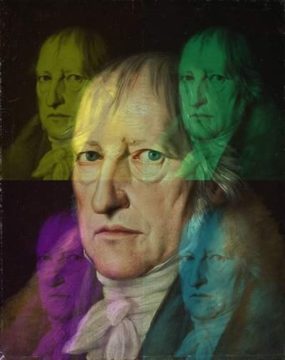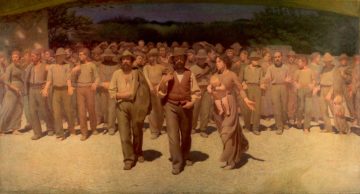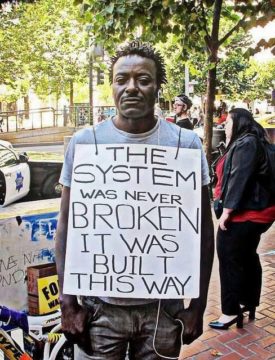by Chris Horner

Among the books of the nineteenth century that have something important to say to us now Hegel’s Elements of the Philosophy of Right (1820) deserves a prominent place. It’s not the obvious contender for a popular read in the 21st century. He doesn’t make it easy for himself, if getting readers was the aim as his ‘grotesque and rocky melody’ (Marx) takes some getting used to, and one has to work a bit to to grasp his arguments. So its not a surprise that is more written about than actually read. This is a pity, as it is right up there with Plato’s Republic and Hobbes’ Leviathan as one of the great works of ethical and political philosophy, with arguably even more direct and relevant things to tell us about our society than those other two classics. It’s a text that has been seriously misunderstood and misrepresented – most notoriously by those who represent him as having announced ‘the end of history’. It is true that something, for Hegel, is coming to an end in our time, but it isn’t exactly history. Hegel gives us an acute and pressingly relevant diagnosis of both the promise of modernity, and the contradictions that threaten it. Citizens in the age of Trump, Johnson, Xi Jinping and Biden would do well to attend to what he has to say in these pages.
It is a troubling text for liberals, not because it is anti liberal in the sense of being opposed to the values liberals hold dear (dignity of the individual, freedom of conscience, rights and so on) but rather because its author regards the insights of liberals as dangerously limited. Liberalism, with its focus on the freedom of the individual, sees the function of the state as guarantor of the freedom of the individual, in the context of a civil society and free market. But for Hegel, genuine freedom means more than this.
He argues that there must be an orientation on the part of citizens to those institutions that ground the freedom of the individual in an objective order – an ethical life that requires more of the state than the role of external guarantor of negative freedom (the freedom to do as one wishes, provided one does not impinge on the freedom of others). Citizens should understand themselves as having a place in that order, as the site in which they may truly actualise their freedom, which is not conceived abstractly, but rather as situated at a point in history. A certain self-understanding that can recognise and reflectively endorse works of the ‘spirit’ embodied in institutions and in an ethical life, one that is a necessary condition for freedom: ‘the habit of the ethical appears as second nature’.
The text has intimations of the profound, perhaps insoluble, problems that any liberal state, based on a market economy, faces. These problems can be seen as arising not accidentally or contingently, but necessarily from the features of the state that Hegel describes. On this account, states and institutions are prone to change, and this change arises from the kinds of contradictions generated by the working of the very civil society that makes them distinctive: the accumulation of wealth in a capitalist economy also generating inequality and poverty. It is possible to grasp what has been happening, subject to the limitations that one’s perspective is bound to have. Philosophy is ‘its time held in thought’, as Hegel writes in the preface :
As far as the individual is concerned, each individual is in any case, a child of his time; thus philosophy too is its own time comprehended in thoughts. It is just as foolish to imagine that any philosophy can transcend its contemporary world as that an individual can overleap his own time or leap over Rhodes.
And a little later:
As the thought of the world, it appears only at a time when actuality has gone through its formative process and gained its completed state. This lesson of the concept is necessarily also apparent from history, namely that it is only when actuality has reached maturity that that the ideal appears opposite the real and reconstructs this real world, which it has grasped in its substance, in the shape of an intellectual realm. When philosophy paints its grey in grey, a shape of life has grown old, and it cannot be rejuvenated, but only recognised, by the grey in grey of philosophy; the owl of Minerva begins its flight only with the onset of dusk.
Night is falling on the state that he will go on to describe.
 Francis Fukuyama is perhaps the most celebrated proponent of the ‘End of History’ thesis, which dates from the time of the fall of the Berlin Wall. In the original essay ‘The End of History?’ Fukuyama – writing in what he conceived as following a broadly Hegelian spirit – famously claimed that the bourgeois liberal state was, in effect, the final form of human political history. The problem, of course, was that history, far from having stopped, was already preparing the surprises of 9/11 and the banking crash of 2008. A more genuinely Hegelian approach would have been to examine the various forces that were already beginning to change political and economic landscape in the 1990s, and that would create the kind of existential threats to America that we see today.
Francis Fukuyama is perhaps the most celebrated proponent of the ‘End of History’ thesis, which dates from the time of the fall of the Berlin Wall. In the original essay ‘The End of History?’ Fukuyama – writing in what he conceived as following a broadly Hegelian spirit – famously claimed that the bourgeois liberal state was, in effect, the final form of human political history. The problem, of course, was that history, far from having stopped, was already preparing the surprises of 9/11 and the banking crash of 2008. A more genuinely Hegelian approach would have been to examine the various forces that were already beginning to change political and economic landscape in the 1990s, and that would create the kind of existential threats to America that we see today.
Hegel need not be understood as presenting the rational state of c1821 as finished form. It is possible to read the Elements of the Philosophy of Right as showing that that the kind of state described was incubating problems it might not be able to resolve without a radical transformation. The most obvious problem of this kind is that of the clash of right represented by the poverty created by the working of modern civil society, and its outcome, the generation of what he calls ‘the rabble’.
Hegel is aware that the nascent capitalist state and society he is describing will create a class of people deprived of the benefits of the society in which they live. They will be in it, but feel excluded from it. The very processes that allow the accumulation of wealth disadvantages others. So we get a class of disadvantaged people:
When a large mass of people sinks below the level of a certain standard of living – which automatically regulates itself at the level necessary for a member of the society in question – that feeling of right, integrity, and honour which comes from supporting oneself by one’s activity is lost. This leads to the creation of a rabble, which in turn makes it easier for disproportionate wealth to be concentrated in a few hands.
Although Hegel offers a few clues as to how their condition might be alleviated, he does not show how the problem of this rabble – the class of people who are excluded from the benefits of the society they are nominally a part – can be resolved. Although ‘poverty in itself does not reduce people to a rabble’, he is clear that poverty leads to the ‘the inward disposition associated with poverty, by inward rebellion against the rich, against society, the government, etc.’ and he concludes the addition to S 244 with the important observation that:
No one can assert a right against nature, but within the conditions of society hardship at once assumes the form of a wrong inflicted on this or that class. The important question of how poverty can be remedied is one which agitates and torments modern societies especially.
Although Hegel is able to suggest public works and colonisation as ways of aiding or sloughing off an excess population of hungry people, these are palliatives, not solutions. Poverty is not some accidental or contingent feature of the modern state as presented by Hegel, but is a necessary effect. As he remarks in his lectures of 1819-20: ‘the emergence of poverty is in general a consequence of civil society, and on the whole it arises necessarily out of it’ and he continues a little later:
In civil society it is not only natural distress against which the poor man has to struggle. The poor man is opposed not only by nature, a mere being, but also by my will. [..] Self-consciousness appears driven to the point where it no longer has any rights, where freedom has no existence. In this position, where the existence of freedom becomes something wholly contingent, inner indignation is necessary. Because the individual’s freedom has no existence, the recognition of universal freedom disappears. From this condition arises that shamelessness we find in the rabble. A rabble develops chiefly in a developed civil society.
Interestingly, he sees that such an unequal society will lead to not one but two rabbles: the poor and dispossessed at one end and the rich at the other. Both are corrupted – one by poverty, the other by riches. This is an unavoidable effect of of this kind of society and constitutes a crisis for Hegel’s presentation of the rational state. Arguably, the text that is most relevant here is in the section on morality, in the discussion of the ‘right of distress’. Here Hegel indicates what is in effect a clash of rights – that of the right to life of the destitute against the abstract right of society:
Life, as the totality of ends, has a right in opposition to abstract right […] If someone whose life is in danger were not allowed to take measures to save himself, he would be destined to forfeit all his rights; and since he would be deprived of life, his entire freedom would be negated.
 If the person who is deprived of bread is not allowed to steal, then he is deprived of everything – his life and thus his right to have rights. The existence of this poverty, and of the ‘right of distress’ implies a fundamental clash of rights at the heart of society, one that does not admit of an obvious resolution: ‘in the face of this loss of right, right as such disappears’. To deny the poor man his right to a decent life is to stigmatise him as not having the right to have rights, to bare life below ‘a certain standard of living’. We can link this observation to the problem of the poor: a class of people sinking below the level of a decent life. Here we have not a minor problem that can be easily reformed out of existence, but something basic in the kind of society that Hegel is outlining: the fundamental opposition, or contradiction between a society that in accumulating wealth tends to create a class of the dispossessed and the rights of those peoples to a life that recognises them not as rabble but as full and equal citizens. The step from this to Marx’s conception of the proletariat is not hard to take.
If the person who is deprived of bread is not allowed to steal, then he is deprived of everything – his life and thus his right to have rights. The existence of this poverty, and of the ‘right of distress’ implies a fundamental clash of rights at the heart of society, one that does not admit of an obvious resolution: ‘in the face of this loss of right, right as such disappears’. To deny the poor man his right to a decent life is to stigmatise him as not having the right to have rights, to bare life below ‘a certain standard of living’. We can link this observation to the problem of the poor: a class of people sinking below the level of a decent life. Here we have not a minor problem that can be easily reformed out of existence, but something basic in the kind of society that Hegel is outlining: the fundamental opposition, or contradiction between a society that in accumulating wealth tends to create a class of the dispossessed and the rights of those peoples to a life that recognises them not as rabble but as full and equal citizens. The step from this to Marx’s conception of the proletariat is not hard to take.
One can, of course, read the passage, not as an awful warning of the end times of bourgeois order, but as an argument for more state spending on welfare programmes. Still, it is clear that the kinds of pressures on bourgeois society described by Hegel as endemic to that kind of system have not been getting enough attention in the unequal societies of the ‘liberal’ west.
 The Elements of the Philosophy of Right points to something problematic about the ethos of a market society in which the state’s only role is restricted to preventing harm. Hegel’s conception of ethos and ‘ethical substance’ involves an orientation toward the common good that transcends the getting and spending by individuals in civil society. While the modern state is conceived as promoting individual, subjective freedom, that state is also more than the aggregation of individual wills and more than the external regulative agency which prevents harm to individuals and alleviates suffering. For Hegel, the individual achieves a kind of self-actualisation through promoting a common good:
The Elements of the Philosophy of Right points to something problematic about the ethos of a market society in which the state’s only role is restricted to preventing harm. Hegel’s conception of ethos and ‘ethical substance’ involves an orientation toward the common good that transcends the getting and spending by individuals in civil society. While the modern state is conceived as promoting individual, subjective freedom, that state is also more than the aggregation of individual wills and more than the external regulative agency which prevents harm to individuals and alleviates suffering. For Hegel, the individual achieves a kind of self-actualisation through promoting a common good:
The state is the actuality of concrete freedom. But concrete freedom requires that personal individuality and its particular interests should reach their full development and gain recognition of their right for itself (within the system of the family and of civil society), and also that they should, on the one hand, pass over of their own accord into the interest of the universal, and on the other, knowingly and willingly acknowledge this universal interest even as their own substantial spirit, and actively pursue it as their ultimate end.
This implies a consideration of freedom and ethos that goes beyond a good deal of liberal thought. Arguably, a society which has no ‘Hegelian’ conception of the common good embedded in its ‘ethical substance’ will find it increasingly difficult to motivate people to help the less well off despite exhortations to generosity, the better angels of our nature, national pride etc. Invoking patriotism may prove futile, if that patriotism is fixated on a romantic narrative of great men and stirring speeches, rather than the unglamorous business of expressing social solidarity in everyday life. This ethos is difficult to encourage in a highly competitive and individualist society, in which private goods are emphasised at the expense of a broader conception of a public realm and a common good.
Growing alienation and inequality can be grasped through a patient mapping of changes in the economy and society. They can be viewed as a result of the erosion of the ethical life, or ethical substance (Sittlichkeit) that Hegel insists is essential to avoid atomism:
According to the principle of atomicity, each cares merely for himself, and does not concern himself about anything in common […] This principle gives such a person over to contingency. Our standpoint of reflection, this spirit of atomicity, this spirit of finding your honour in your individuality and not in what is common – this is destructive.
What of the ‘end of history’ thesis? It’s hard to see it as Hegel’s message about modernity. For Elements of the Philosophy of Right closes not with the state as peaceful, self-contained entity but with war, in which the modern state confronts an external Other:
In existence this negative relation of the state to itself thus appears as the relation of another to another, as if the negative were something external. The existence of this negative relation therefore assumes the shape of an event, of an involvement with contingent occurrences coming from without.
The internal affairs of the state cannot be divorced from its fate as a state among states, and from its external relations generally: they are mutually conditioning. The kind of state discussed by Hegel in the Elements of the Philosophy of Right is something quite other than a stable and reformist liberal democracy, at peace with itself and hard at work abolishing the avoidable suffering of inequality and exclusion. It has its internal contradictions: the accumulation of wealth alongside the immiseration of the poor, the creation of a rich and a poor rabble, the tendency of a capitalist order to erode the very ethical life on which social solidarity must depend. And it has the necessary confrontation with the contingencies presented by an external other – war, in the shape of antagonists whether in the form of rival states or terrorist organisations. The internal affairs of the state reflect its international relations (acts of terror from abroad helping to militarise and generalise a ‘security state’ within). But the internal problems (atomicity, inequality etc) themselves reflect the place of the state in the dynamic World Market. And Hegel’s sense of history includes the idea that that state is subject to change and decline at the ‘world historical’ level:
The particular history of a world historical nation contains, on the one hand, the development of its principle from its latent childhood phase until it blossoms out in free ethical self consciousness and makes its mark in universal history, and on the other, the period of its decline and fall – for these denote the emergence within it of a higher principle which is simply the negative of its own. This signifies the transition to the higher principle and hence the transition of world history to another nation
The contemporary examples are surely obvious. Something is coming to an end, but that something isn’t history.

